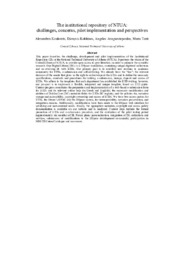The institutional repository of NTUA: challenges, concerns, pilot implementation and perspectives
Date
2007Author
Κουλούρης, Αλέξανδρος
Κόκκινος, Διονύσης
Αναγνωστόπουλος, Άγγελος
Tanti, Maria
Anagnostopoulos, Angelos
Koulouris, Alexandros
Kokkinos, Dionysis
Metadata
Show full item recordAbstract
This paper describes the challenge, development and pilot implementation of the Institutional Repository (IR) at the National Technical University of Athens (NTUA). It portrays the vision of the Central Library of NTUA, to provide open access to grey literature, in order to promote the scientific research. Our Digital Library (DL) is a DSpace installation, containing unique digitized collections and an evolving IR with ETDs. Our primary goal is to establish new routines to academic community for ETDs, e-submission and self-archiving. We already have the "law"; the relevant decision of the senate that gives us the right to collect-deposit the ETDs and to define the necessary specifications, standards and procedures for writing, e-submission, storage, deposit and access of ETDs. We adhere to the templates that each department has established for ETD writing, however, our prospect is to implement a flexible, integrated and unique template, based on ETD guide. Current progress constitutes the preparation and implementation of a web-based e-submission form for ETDs and its relevant online help (in Greek and English); the necessary modification and addition of Dublin Core (DC) metadata fields for ETDs DC registry; and the policies for, metadata storage and accessibility, copyright ownership and access of ETDs. We have two access points for ETDs, the library’s OPAC and the DSpace system, for interoperability, metadata preservation, and integration reasons. Additionally, modifications have been made to the DSpace web interface for satisfying our user-centered needs. Finally, the appropriate metadata, copyright and access policy documentation is available on our website and is analyzed. Current steps include the formal promotion of ETDs and e-submission procedure, and the evaluation of the pilot testing period (approximately six months) of IR. Future plans: personalization, integration of DL collections and services, submission of modifications to the DSpace development community; participation in NDLTD Union Catalogue and movement.
